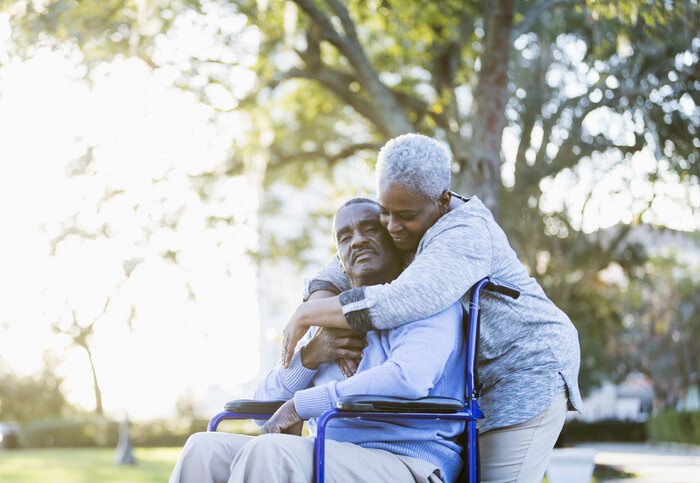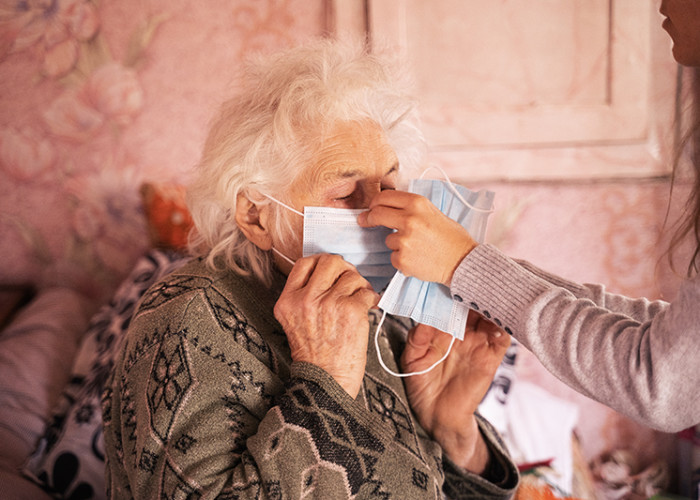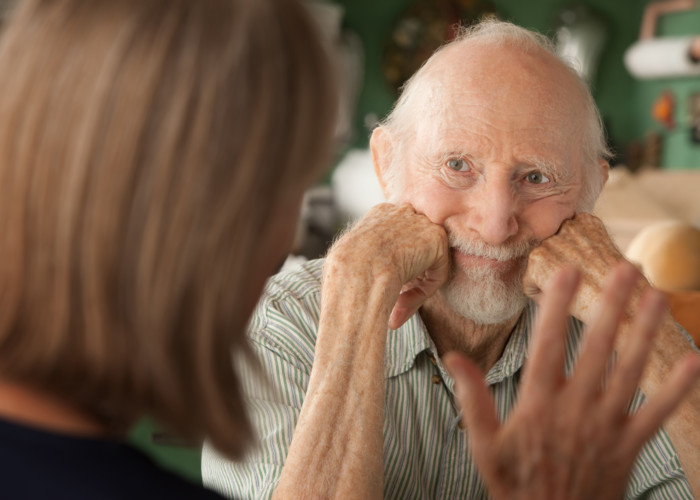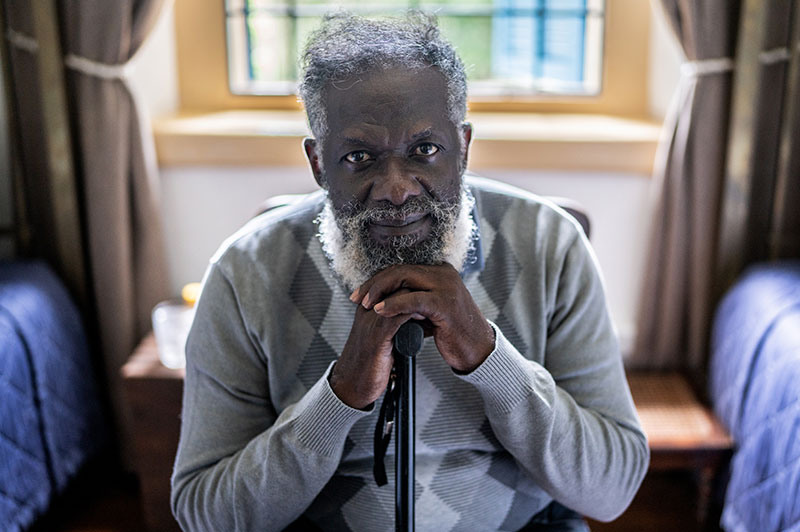Senior Transitions
Walking Each Other Home: How to Ease End-of-Life Care
Learn how to ease end-of-life care with these tips.
Although the holiday season may be filled with joy, it can also spark feelings of loss and nostalgia for loved ones who are no longer with us. It’s also an incredibly poignant time for anyone who is caring for a loved one nearing the end of life. The ebbs and tides of life, as we know, do not always follow our schedules, routines, or desired outcomes. It becomes crucial to know how to ease end-of-life care to bring much-needed comfort during this trying time.
If you are in the midst of a season of providing end-of-life care, here are some thoughts to keep in mind that will help you best help the person in your care – as well as yourself.
Provide a calming environment. Ram Dass, author of … Read More »
The Harm in Talking to the Elderly Like Babies
We all need to understand how disrespectful talking to the elderly like babies is, and to avoid this common practice.
Watch what happens at the next family members get together when a new mother places her baby in someone’s arms. The person is likely to shift instantly into baby mode: a sing-song, high-pitched voice, exaggerated facial expressions, and overly-simplified speech. Of course, this is quite normal and actually beneficial to an infant’s growing brain. Sadly though, it is also quite common to hear people talking to the elderly like babies too. This can be so harmful to the elderly, that there’s a word to describe it: elderspeak.
A recent research study by Susan Kemper, a professor specializing in gerontology at the University of Kansas, matched senior listeners with younger speakers. Even with the seniors’ instructions just to listen … Read More »
Tips to Make the Most From Family Senior Care Meetings
Make family senior care meetings more productive and efficient with these tips.
“It takes a village” was never a more accurate statement than when taking care of an older family member. It’s important for that “village” to have effective, ongoing communication so that you can offer the best care and to make sure everyone taking part in that care is on the same page. It’s also critical for family caregivers to have the opportunity to express concerns and to come together to get to resolutions, to share various perspectives, and to continue to be proactive in preparing for the future.
Holding senior family care meetings that produce good outcomes includes thinking through the following:
Who should always be included – and who should not? Unquestionably, those providing direct or indirect care for the senior loved one should attend, as … Read More »
End-of-Life Care Tip: Participating in Tough Conversations
When providing end-of-life care, one of the best gifts you can offer is a listening ear.
Sharing what’s on our hearts with those we love is never more important than when someone is nearing the end of life. There are often unspoken sentiments and unresolved issues that, once verbalized, can bring peace and a deeper connection with our loved ones in their final days.
As Dr. Jessica Zitter, physician in critical and palliative care medicine at Highland Hospital in Oakland, CA explains, “Those are opportunities for people to take stock and say, ‘I want to be more intentional about how I want to relate to people in my life.’ Death should really be seen as the last opportunity that you have to make amends and clean things up before you’re in the next world, wherever that may be.”
Read More »
Elective Medical Procedures: Assessing the Safety for Seniors
Determine the safety of elective medical procedures with these tips.
The COVID-19 pandemic put our world on pause, including, among many other activities, medical appointments and procedures. In fact, nearly half of all adults either cancelled or put off routine medical care and elective medical procedures since the coronavirus crisis began, leading physicians to become concerned about the consequences.
As we tentatively strive for a new normal, it’s important to talk with your doctor about any procedures you might have been considering pre-pandemic, and to get answers to the following questions to help you gauge the safety of following through with them now.
Is the medical facility where I’ll be treated also treating COVID-19 patients, and are the same medical staff who will care for me also taking care of them? If so, what precautions are in place … Read More »
How a Hospice Referral Can Provide Comfort and Eliminate Fear
A hospice referral can help patients meet end-of-life goals.
We often educate on the importance of not delaying a hospice referral because we believe an earlier referral allows the patient and his or her family to better prepare mentally and spiritually for the end of the patient’s life. Yet a common misconception that hospice care is merely symptom management often leads to a later referral. In fact, hospice care involves many additional benefits to provide comfort:
Provides assistance in obtaining appropriate equipment and medications
Empowers families to take care of their loved one in the comfort of home
Helps alleviate the fear that often occurs for patients and their families
Helps a spouse with Social Security issues, financial issues, and long-term care questions
Addresses family dynamics and spirituality concerns (if any exist)
Hospice is not about dying, but about quality of life … Read More »
Dementia Caregiver Tips for COVID-19
Our team is here to keep you informed with the most useful dementia caregiver tips for COVID-19.
Providing caregiving assistance for your family member with dementia is complicated under the best of conditions; mix in a global pandemic, one that calls for social distancing, masks, and meticulous sterilization of both ourselves and the environment, and the challenge may seem impossible.
Hired Hands Homecare’s team of caregivers offers the following dementia caregiver tips to help reduce anxiousness and irritation for those diagnosed with dementia, while keeping both them and their caregivers safe:
Make self-care a top priority. Now more so than ever, it’s extremely important to assess your own personal degree of stress, and take action to make sure you’re healthy – both physically and emotionally. You can only supply the best help for a senior loved one if your … Read More »
Avoid a Hospital Visit for the Seniors You Love This Holiday Season With These Tips
While we may envision a Norman Rockwell-worthy Thanksgiving celebration, with the whole family enjoying quality time together and Grandma’s traditional feast, the reality for many families includes something unexpected: a hospital visit. In fact, statistics show that E/R visits for the elderly jump an astounding 10 – 20% during the holidays. What can you do to avoid a hospital visit this holiday season?
While pinpointing the exact reasoning behind this increase is difficult, it stands to reason that one factor could be family members who haven’t spent time with an elderly relative in the months prior to the holiday season, only to discover then that his or her condition has deteriorated.
Dr. Tamara Kuittinen of Lenox Hill Hospital explains, “It’s an issue of out of sight, out of mind for many people. If you haven’t seen your mom … Read More »
Accepting a Chronic Disease Diagnosis Is Beneficial for Seniors and Their Family Members
Facing a chronic disease diagnosis head-on does not mean giving up.
In Isaac Asimov’s opinion, “The easiest way to solve a problem is to deny it exists.” It’s a standard feeling for many family caregivers when their loved one is faced with a chronic disease diagnosis, such as dementia. Even though this can instill some measure of comfort in thinking that life can carry on like it always has, if only we don’t acknowledge this new reality, the truth is that acknowledgement is extremely important in order to get the necessary support.
It is understandable for a family member to wish to deliver all of the care a senior loved one needs. Nevertheless, frequently in the crux of denial are feelings of guilt, helplessness, and in some cases incompetence in the ability to “fix things.” And you will … Read More »
“I Don’t Need a Caregiver!”: Tips to Help an Elderly Parent Refusing Care
Learn how an older adult may retaliate when you recommend an in-home caregiver.
Although many older adults adapt quickly when a new caregiver comes into the home, and begin to thrive and enjoy a higher quality of life, there are some seniors who may continue to feel threatened. What do you do if your elderly parent is refusing care? At Hired Hands Homecare, providers of elder care in Marin, we’re sensitive to the feelings of each senior we serve and are experienced in helping to ease concerns and restore peace.
A senior who feels the need to convince his or her family that a caregiver is simply not necessary may implement one of these common tactics:
Becoming argumentative. Frustrations at being perceived as incapable of self-care may display as an increase in arguments, even over seemingly trivial matters. It’s … Read More »

















